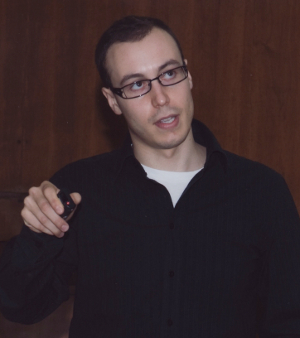 |
|
Fig. 1:
Dr. Massimo Gaspari (MPA)
|
|  |
In his award-winning PhD thesis, entitled “Solving the Cooling Flow
Problem through Mechanical AGN Feedback”, Massimo Gaspari studied the
intimate relationship between cooling and black hole heating in the
cosmic evolution of baryons.
In previous classic theories, radiative cooling of plasma would lead
to the cooling catastrophe, a massive inflow of condensing and
star-forming gas that would manifest itself in the core of galaxies,
groups, and clusters. Using 3D hydrodynamic simulations, executed on
large supercomputers, Gaspari showed that mechanical, bipolar
outflows, which are driven by the central active galactic nucleus
(AGN), can dramatically quench the cooling rates for several billion
years. At the same time this process preserves the cool-core structure
of the system.
Furthermore, the mechanical AGN feedback can reproduce key features
such as X-ray cavities, weak shocks, metals uplift, and
turbulence. The latter is an essential ingredient to drive nonlinear
thermal instabilities, which cause the condensation of extended cold
gas clouds. These are a residual of the quenched cooling flow and can
later provide fuel for the supermassive black hole at the centre.
Thus, cold accretion triggers feedback, reloading the self-regulated
loop in a never-ending “dance” between heating and cooling. In his
thesis, Gaspari tested several models, dissecting the essential
characteristics for a realistic AGN feedback, while paying particular
attention to consistency with observations.
For this analysis, Gaspari will receive the Gratton award in its 11th
edition - the most prestigious Italian prize given to young
astronomers. The award honours the memory of the Italian astronomer
Prof. Livio Gratton, who studied quasars and cosmology at the Milan
observatory and the National Observatory of Cordoba. It is supported
by the Eta Carinae and Tuscolana Associations, the Gratton family, the
Frascati district, and the National Institute for Astrophysics
(INAF). Every two years, an international committee selects a
researcher from an Italian University who has made an innovative and
significant contribution to Astronomy and Astrophysics with his/her
PhD thesis. In addition to the certificate, the awardee receives a
monetary sum of €7,500. The official award ceremony will take place in
Frascati (Rome) on 12 October 2013.
In 2012, Massimo Gaspari joined the Max Planck Institute for
Astrophysics as a postdoctoral researcher in the High Energy
Astrophysics group, working mainly with E. Churazov and R. Sunyaev.
|


